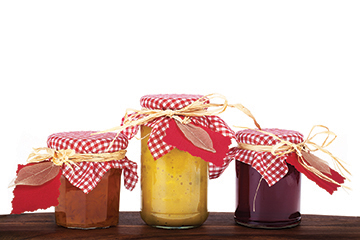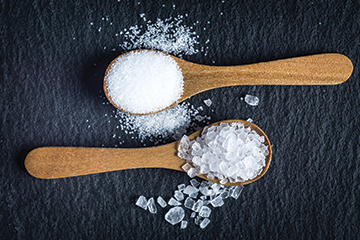
Holiday Food Preserved Gifts

The holidays are a common time for food items to be used for gift exchanges. However, is this really a good idea for a gift? What should you do if you receive a home-processed food item?
It is always best to err on the side of caution, even if you know the person giving the food item. While some recipes such as jams and jellies present less of a risk due to their high sugar content and acidity levels; others like your friend’s famous chunky thick salsa processed in a jar could be harmful for consumption. Salsa on its own merit is not a reason for concern, but when processed in conditions that you do not know creates a reason for concern. Was the product acidified? How long was it processed? The mixture of some low-acid ingredients can create a perfect environment for Clostridium botulinum. And, if it is a thick salsa, chances are it was not processed long enough to destroy spoilage microorganisms.
You may receive a home-processed food item that you know was processed properly and feel safe consuming it.
Even in these cases, it is important to watch for spoilage that might occur. As always, if in doubt, throw it out. Just because a food item is sealed in a jar, does not mean that it is safe for consumption.
The act of giving homemade gifts is not something that should be shied away from, rather consider how you accept and present homemade gifts. In some cases, an unpreserved food item is the safest gift. Reduced risk means there will be more time for holiday festivities!
Using Salt in Canning
In-home canning, salt is primarily for flavor in plain vegetables, tomato products, poultry and meat. Therefore, salt can be left out of these products to reduce the sodium content. In vinegar-based pickles, salt contributes to the flavor. For fermented foods, salt is needed for safety and flavor.
There are many types of salt available. The type to use in canning is a common question. Let’s look at some choices.
Canning and pickling salt is highly recommended for any canning, pickling or fermentation. In canning recipes, when salt is listed as an ingredient, this is the best choice.
Table salt is safe for canning, but it contains anticaking ingredients that do not dissolve and cause cloudiness. The iodine in iodized salt can cause pickles to darken, discolor or be spotty. Iodine can cause cauliflower to turn pink or purple.
Salt substitutes are primarily potassium chloride which can cause metallic flavors. These are not recommended for canning.
Kosher salt and sea salt can measure differently from canning and pickling salt. Sea salt contains various minerals which can cause discoloration or off-flavors. Do not use these for pickling or fermentation.
Never use rock salt, ice cream salt or water softener salt as they are not for human consumption.